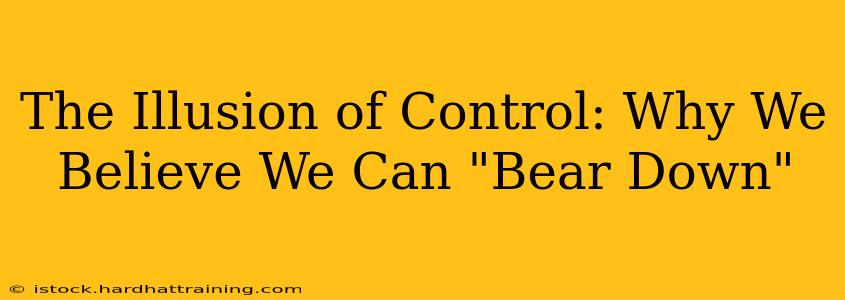We've all been there. Facing a looming deadline, a challenging task, or a stressful situation, we tell ourselves, "I just need to bear down," believing that sheer willpower can overcome any obstacle. This "bearing down," this intense focus and effort, feels like control. But is it really? The truth is, our belief in our ability to control outcomes through sheer force of will often masks a deeper psychological phenomenon: the illusion of control. This article delves into why we cling to this illusion and its implications for our well-being and productivity.
What is the Illusion of Control?
The illusion of control is a cognitive bias where individuals overestimate their ability to influence events, particularly those that are largely or entirely outside their direct control. We attribute success to our skills and effort, while external factors or chance are often downplayed or ignored when things go wrong. This bias is deeply ingrained, affecting our decisions and impacting our emotional responses to both success and failure.
Why Do We Believe We Can "Bear Down" and Succeed?
Several psychological factors contribute to our belief in the power of "bearing down":
-
Motivational Need: The desire to feel competent and in charge is a fundamental human need. Believing we can control outcomes, even when the odds are stacked against us, provides a sense of agency and self-efficacy. This is particularly true when facing uncertainty or threat.
-
Cognitive Biases: Confirmation bias (seeking information that confirms pre-existing beliefs) and the availability heuristic (overestimating the likelihood of events that are easily recalled) can reinforce the illusion of control. If we’ve successfully "borne down" in the past, we're more likely to believe it will work again, regardless of the actual odds of success.
-
Locus of Control: Individuals with an internal locus of control believe they have significant influence over their lives, while those with an external locus of control attribute outcomes to external factors like luck or fate. The belief in "bearing down" is more prevalent among those with an internal locus of control.
How Does the Illusion of Control Affect Us?
The illusion of control isn't inherently bad. A healthy dose of self-belief and determination can be incredibly motivating. However, an overreliance on this illusion can have negative consequences:
-
Increased Stress and Anxiety: When faced with uncontrollable events, clinging to the belief that we can "bear down" can lead to increased stress and anxiety as we struggle against insurmountable odds.
-
Poor Decision-Making: Overestimating our control can lead to risky decisions, neglecting precautions, and underestimating potential threats.
-
Reduced Resilience: When our efforts don't produce the desired outcomes, the disappointment can be amplified, leading to feelings of helplessness and reduced resilience.
Can We Overcome the Illusion of Control?
While completely eliminating the illusion of control is likely impossible, we can learn to manage it more effectively:
-
Realistic Self-Assessment: Honestly evaluate your capabilities and the constraints you face. Identify factors outside your control and accept that some things are simply beyond your influence.
-
Develop Coping Mechanisms: Learn to manage stress and anxiety through techniques like mindfulness, exercise, and healthy lifestyle choices.
-
Seek Support: Don’t be afraid to ask for help when needed. Acknowledging limitations doesn't mean weakness; it's a sign of strength.
-
Focus on Effort, Not Outcomes: Shift your focus from the outcome to the process and the effort you put in. This allows you to feel a sense of accomplishment regardless of the final result.
What if "Bearing Down" Actually Works Sometimes?
It's true that hard work and dedication often lead to success. However, it's crucial to distinguish between situations where effort is genuinely instrumental and those where external factors play a larger role. Attributing success solely to "bearing down" can blind us to the influence of luck, timing, or other contributing factors.
How Can I Tell if I'm Suffering from the Illusion of Control?
Recognizing the illusion of control requires self-reflection. Ask yourself:
- Do I consistently underestimate the role of chance or external factors in my successes and failures?
- Do I take on too much, believing I can "bear down" to accomplish it all?
- Do I experience excessive stress and anxiety when things don't go as planned, despite my best efforts?
- Do I often ignore warnings or advice, believing my own abilities will overcome any obstacles?
If you answered yes to several of these questions, you may be experiencing the illusion of control. Addressing this bias through self-awareness and developing healthy coping mechanisms is crucial for your overall well-being. Remember, accepting the things you cannot control doesn't mean giving up; it means focusing your energy on what you can control, leading to a more balanced and productive life.
